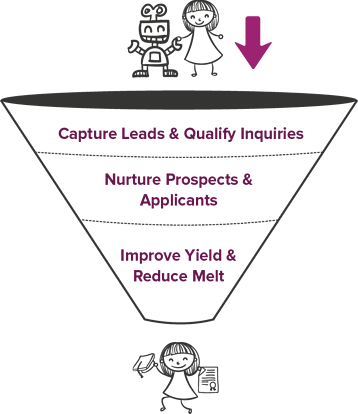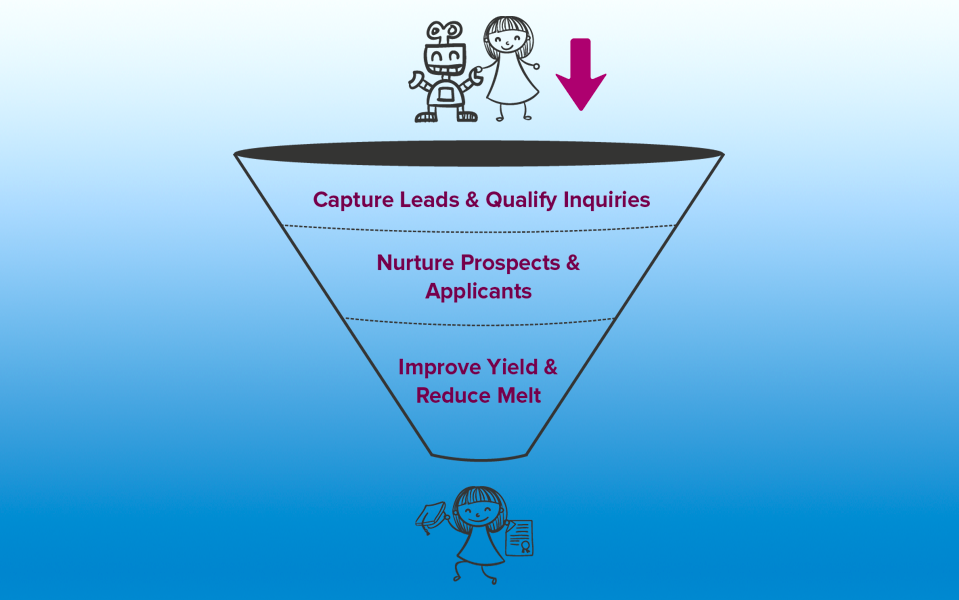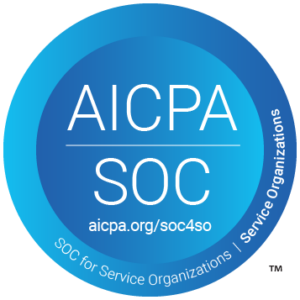Virtual assistants, a.k.a. chatbots, can help you out with any number of different functions, like telling you that you need an umbrella when you leave home, building daily to-do lists, and even recommending movies based on your interests.
AdmitHub specializes in building custom, comprehensive virtual assistants that help colleges guide and serve their students to and through college, but there’s an added benefit for these colleges. Each custom chatbot also reduces the burden that university staff members face on a daily basis. Virtual assistants have a variety of different applications that are helpful for students and also drive important metrics for colleges like yield and retention. Here are a number of different ways universities can use a text-messaging virtual assistant or chatbot throughout the student lifecycle.

Texting with Prospective Students

Text students at a college fair.
To increase application numbers, schools using a virtual assistant can provide a phone number or a Facebook Messenger code that students can instantly message to start a conversation at the college fair. The virtual assistants can create a student profile based on the student’s responses and record the responses in their CRM, significantly reducing the amount of time staff has to spend on data entry. The virtual assistant will also answer questions from prospective students by pulling answers from an ever growing knowledge base. By giving students answers to their questions within seconds, it gives your school a competitive edge by relaying information instantly to prospects when they request it.
Nurture prospective students with “nudges.”
The power of a text nudge has proven to make a big difference in student retention, but it also can strongly influence students in the prospect phase. For example, nudge workflows sent by some of our partners encourage prospective students to attend a campus visit day, join a Class of 2021 University Facebook group, or even apply to the university.
Texting with Admitted Students
Welcome students to school and offer help.
Students have some big decisions to make when they are choosing a college. Welcoming them to your school via text message, and introducing them to their personal assistant at that university, gives the student an instant advisor throughout their decision-making process. On the reactive side, students can ask questions and get instant answers, but they also have the option to connect to a human if they want to communicate with someone directly or if the virtual assistant can’t answer a particular question. On the proactive side, virtual assistants guide students each step of the way, from admission to acceptance to enrolling and setting foot on campus for the first day of classes. These proactive workflow messages can include FAFSA reminders, scholarship search, registering for orientation, selecting a meal plan, and more.
Survey students to gauge their interest.
A simple survey can tell schools a lot, so why not have your virtual assistant ask a quick question and organize a chart with the responses? For example, a school can reach out to students about how interested they are in attending their university. By simply asking on a scale of 1-5, with 1 = I won’t be attending, to 5 = I’m definitely going, counselors can focus attention on the group of students who are on the fence, and potentially positively impact yield. Directors can also gather data to better forecast their pipeline early in the enrollment cycle and match to their historical data.
Texting with Enrolled students
Introduce on-campus resources to underprivileged students.
According to a research study completed by the Pell Institute, only 11% of low-income, first-generation students complete a bachelor’s degree within 6 years of beginning college. Colleges can notify disadvantaged students of the resources available to them over a series of text messages during their first month of classes.
Connect with at-risk students.
For students who are facing challenges and obstacles to their educational path, or who might be at risk of failing or dropping out, it’s essential to be able to identify them, connect with them, and get them help early. Situations often escalate quickly, so universities can use a virtual assistant to quickly check in on students and then respond by connecting them to an advisor or other on-campus resources immediately to help them get back on track.
Nudge students to get involved.
Some students just need a nudge to attend an event on campus. Virtual assistants can send reminders to specific events, sports contests, and campus-wide activities to segmented groups of students. With email open rates among students hovering just below 20%, students are much more likely to learn about an event via a text message. The virtual assistant could even sign up the student if registration is needed, instead of forcing students to go online to register.
Texting with Alumni
Remind alumni of upcoming events.
Alumni associations spend a lot of time and use a lot of resources to create memorable events for alumni, and virtual assistants can easily deliver invites, facilitate registration, and answer questions about the event.
Keep in touch.
Who doesn’t like it when someone wishes you a happy birthday (well, up to a certain age, anyway)? Virtual assistants can wish alumni a happy birthday, graduation anniversary, and answer questions alumni ask to make sure that they maintain a connection. All this can be done without using staff resources, but by maintaining a connection can assist with alumni development by keeping their alma mater top of mind.
The student lifecycle is a long period of time, and there are so many ways for schools to develop a really strong brand relationship. You can imagine how familiar students could get with a virtual assistant if that chatbot let them know they had been accepted to that college, and then continued to have personalized, two-way conversations from when they were a prospect to even after they’ve graduated. With advancements in technology and millennials spending more time on messaging platforms, virtual assistants and chatbots are revolutionizing communications with students. If you are interested in learning more about the possibilities of a virtual assistant at your school, submit a demo request and we’ll reach out shortly!
P.S. Can we send you an email?
We send out an email with our latest content and company updates every month. You can join hundreds of education professionals by signing up for our newsletter here.

